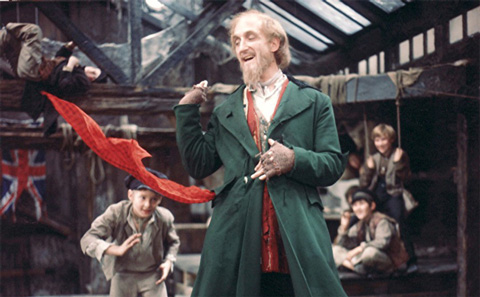London Swindles in the Nineteenth Century September 21, 2015
Author: Beach Combing | in : Modern , trackbackHere are some lovely London swindles from the nineteenth-century.
Bet Swindle: Victim in railway carriage joined by man x and man y (travelling separately), man x loquacious and obnoxious American who bets victim that Henry VIII had six not seven wives. The two agree to wager five pounds that they give to y. Y turns out to be a school teacher who has a history text book in his bag. He confirms victim right and just as the train is arriving palms off two fake five pound notes. Ham Tel, 13 Mar 1897, 10.
Bird Fancier: X turns up at house of famous bird fancier (who is out) and offers two rare looking birds. Wife pays in money and surplus bird skins. The birds bought are actually British greenfinches with tails glued on with sealing wax. Ken Gaz, 29 Sep, 1863, 8
Change Please: X comes ‘from the tavern across the road’ to ask for silver for gold change at a butcher. He tells the butches that he will send a boy later. The boy comes, gets the change and X takes the change at the door of the pub, sending him back to ‘get a steak’. X, of course, has nothing to do with the pub. Lon Stan, 7 Oct 1871, 2.
Death Certificates: X watches the newspapers for missing person ads, fakes death certs and then pockets the reward for proof of death. Fal Her, 20 Feb 1868.
Dying Man: X arrives at vicarage, dressed as a priest, while the vicar (victim) is out. A man is dying and X needs the communion plate to give the sacrament. Lon Stan, 4 Nov 1896, 2.
Grating Compensation: X and Y loosen grating before house and X pretends to fall down it injuring himself while Y demands compensation from the owners (the victims). Dun Evn Tel, 1 Apr 1897, 2 [ended in a conviction not an April fool’s joke!]
House Rent: X, Y and Z rent a furnished London house, they then sublet it unfurnished having sold all the furniture on. Ed Ev New, 1 July 1880, 3
Police to Rescue: X goes to jeweler (victim). He tries to escape with a lot of jewels but is taken into charge by policeman (Y), who also takes the jewelery down to the station. Of course Y is not a policeman. Rey new, 31 Mar 1889, 4 see also Liv Mer 23 Jan 1849, 2.
Prosecutor Danger: X is about to be prosecuted and so sends Y and Z to the house of the prosecutor to announce that the case has been cancelled. X is not then prosecuted. 5 Feb 1859, 12.
Reviewer: X dresses up and goes to visit artists. He explains that he is starting a new magazine and also that he is a reviewer for Punch and Fun and other reviews. He asks for subscriptions, the implication being that if they subscribe to his new (and non existent) magazine they will get good reviews. The victims subscribe… Gran Jour, 16 Jul 1864, 2.
Sealed Book: X offers to sell books in an envelope, sometimes indecent books or sometimes mystical tomes ‘The six and seventh books of Moses or the Seven Times Sealed Book of the Greatest Secrets’. Victim pays only to discover Mr Gladstone’s Speeches on the Irish Question or other such treasures. Ab Eve News, 13 May 1889. 2
Shilling Trick: X asks victim for change for a shilling. Victim opens hand with coins and X takes coin but then says ‘you’ve got a French piece there’. Victim refuses and X gives victim back his money minus a couple of coins. Taun Cour, 25 may 1859, 4.
Weights and Scales: X masquerading as an inspector comes to check a shop’s weights and scales and finds them wanting. X demands a fine. Lut Times, 3 Jul 1875, 3
Will Swindle: X finds an elderly woman, tells her that her aunt has died, but that X will need money to bring her her bequest. Ed Ev New, 19 mar 1875, 4
Can any add to these: drbeachcombing AT yahoo DOT com
30 Sep 2015: Stephen D writes ‘if you are interested in swindles in the past, have you read (of course you may well have done) David Maurer’s “The big con“, which has good descriptions of various aspects (the fight, the store, the wire, the Spanish Prisoner, etc) in the earlier twentieth century.’
Thanks!



